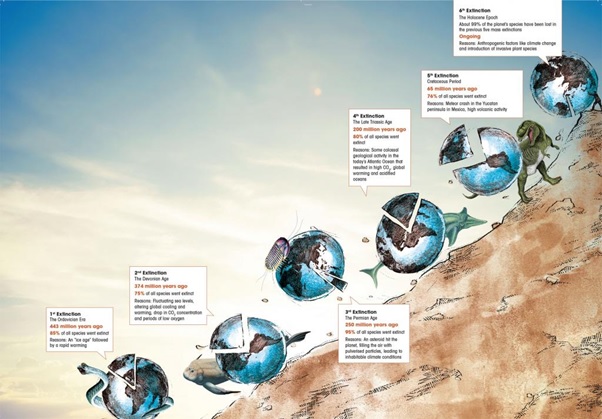

11th April 2022 (6 Topics)
Context
Earth is losing species at an unprecedented rate; this marks the beginning of the Anthropocene Epoch, a self-aggrandising nomenclature that highlights our disproportionate and irreversible impacts on the surroundings.
About
About mass extinction of species:
- Mass extinction refers to a substantial increase in the degree of extinction or when the Earth loses more than three-quarters of its species in a geologically short period of time.
- So far, during the entire history of the Earth, there have been five mass extinctions.
- The five mass extinctions that took place in the last 450 million years have led to the destruction of 70-95 per cent of the species of plants, animals and microorganisms that existed earlier.
- These extinctions were caused by “catastrophic alterations” to the environment, such as massive volcanic eruptions, depletion of oceanic oxygen or collision with an asteroid.
- After each of these extinctions, it took millions of years to regain species comparable to those that existed before the event.
- The sixth, which is ongoing, is referred to as the Anthropocene extinction.
- Researchers have described it as the “most serious environmental problem” since the loss of species will be permanent.

Biodiversity loss as per different reports:
- Intergovernmental Science-Policy Platform on Biodiversity and Ecosystem Services (IPBES) Report:
- Evolution and extinction are intimately linked to each other, but never before have had we witnessed such a rapid change in biodiversity.
- “The Global Assessment Report on Biodiversity and Ecosystem Services”, the first such by the Intergovernmental Science-Policy Platform on Biodiversity and Ecosystem Services (IPBES) released in 2019, shows that the current rate and scale of extinction is unprecedented and is being caused majorly by humans.
- The IPBES assessment says that 1 million animal and plant species face extinction and thousands of these would become extinct within decades.
- About 40 per cent of the planet’s amphibian species are threatened with extinction.
- Since 1900, the number of native species in most of the land-based habitats has declined by 20 per cent.
- The World Wildlife Fund’s (WWF’s) “Living Planet Report 2020” says the Asia Pacific region lost 45 per cent of its vertebrate population in four-and-half decades, while the average global loss is 68 per cent.
- The biennial report by WWF and Zoological Society of London:
- It is prepared on basis of the global dataset analysed between 1970 and 2016.
- The report has tracked almost 21,000 populations of mammals, birds, fish and reptiles globally to reach its conclusions.
- It showed the loss of vertebrate population was the highest in the Caribbean and Latin America (94 per cent), followed by Africa (65 per cent), with Europe and Central Asia showing the least loss (24 per cent).
Biodiversity Loss in India:
- The loss could be higher than the global average in India, which has lost 12 per cent of its wild mammals, 19 per cent of its amphibians and 3 per cent of its birds over the past five decades.
- Out of about 0.1 million animal species, as recorded in the country till December 2019, about 6,800 are vertebrates.
- Among these, nearly 550 fall in the critically endangered, endangered and vulnerable categories, according to the Zoological Survey of India
Reasons behind the biodiversity loss:
- The “Living Planet Report 2020” points out five major reasons behind the biodiversity loss across the planet:
- Changes in land and sea use (habitat loss and degradation),
- overexploitation of species
- invasive species and disease
- pollution
- climate change
- In the Asia Pacific region, including India that is experiencing loss of species higher than the global average, habitat degradation is the biggest trigger, followed by species overexploitation and invasive species and disease.
More Articles


